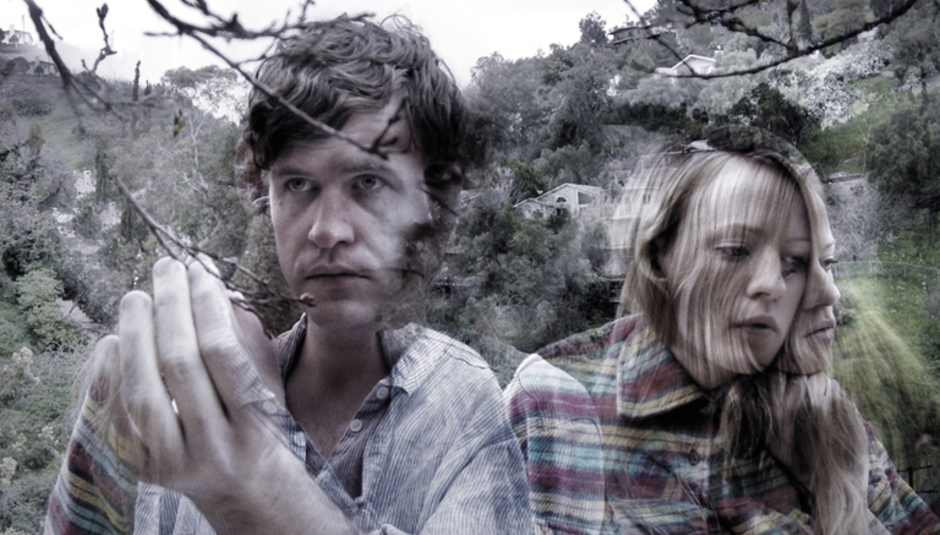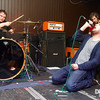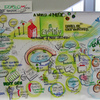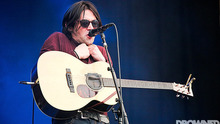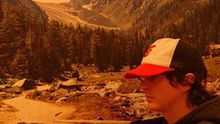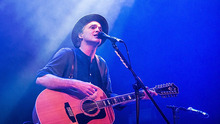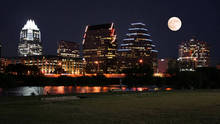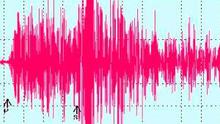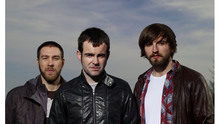Their origins may be in the still-thriving DIY scene in Brooklyn, but Mary Pearson and Rob Barber of High Places have always had a glassy pop edge to their music. Subtle stylistic shifts marked the transition from their earliest singles to their self-titled debut album, and further changes are afoot on the new High Places vs. Mankind. Their live set now features plenty of guitar playing from the pair, occasional vocal interjections from Mary’s sister, Laura, and even that most un-punk rock of instruments—the bassoon. DiS called High Places in their adopted home of Los Angeles, where we spoke about Judas Priest and Saturday Night Fever, their work on Liars’ Sisterworld, and how they felt about moving from New York to California.
DiS: What are your earliest memories of listening to music as children?
Mary Pearson: It’s hard to go back to the very first. My family is very musical. My grandfather taught music at a University, and my mother taught music at an elementary school. My mom always played piano and organ at church, and I was the youngest of four kids, and my two older sisters and I would always sing in church, since I was literally two years old. So music was always around me, and it’s hard for me to pick out when that began. But I always felt like my sisters were these natural musicians, and my mom too. I was the least natural, but I kind of wanted it the most. They just took it for granted that they could sing like anyone on the radio, and harmonise at the drop of a hat. My sister watched that movie Amelie when it came out and went home and played the theme song on piano. She just has that ear.
Rob Barber: I think this is awesome, but most people will think this is terrible: I inherited the Saturday Night Fever soundtrack from my older brother. If I was more culturally aware in 1984, or whatever year it was, I don’t think I would have been listening to the Bee Gees. That would have been the worst thing you could do in 1984, because that was the era of ‘Disco Sucks’ T-shirts. But I still love them in a way, because I think they’re one of the weirdest pop bands that ever happened, as far as vocally speaking. I was always pulled into music that had really weird elements, like the Bee Gees’ vocals, or there was a George Benson song called ‘Give Me the Night’ that had these really creepy backing vocals. I remember being in the car and being like, ‘woah, that’s super cool because it’s super weird’. So I think I was always attracted to weird things in pop music, even when I was like 6 or 7, I would be drawn to the weirder elements. That’s one thing I thought about when I was pretty young.
DiS: What was the first gig you attended?
RB: The first I went to was when I was in elementary school with my friend’s older brother, and it was Judas Priest’s Turbo tour. Which is the tour from Heavy Metal Parking Lot, if you’ve seen that. My actual next weird show was Samhain, which was just after the Misfits but before Danzig solo. It was at the Ritz in New York City. That was terrifying, but it was fun.
DiS: Were there bands you bonded over when you first came together?
MP: Yeah, Rob made me this mix CD that was four hours long when we first met. There were so many bands on it that I hadn’t heard of before, or I knew their name and I didn’t really know their music. I was really excited on the entire thing. There was a lot of Broadcast on it, there was the Incredible String Band, there was that Hawaiian musician, Bobby Brown. I think that was a really big influence on us when we started. I was living in a fairly small town in Michigan and he was living in New York, and he opened my mind to so much new stuff. That was pretty exciting.
RB: I’m going to have to go out on a limb: I would have to say the first Beat Happening tape, that was re-released as a CD. That was something where we were both like, ‘This record is really weird’. But it’s kind of homemade, and it’s completely at odds with…I mean, I loved a lot of what was going on in New York at the time, but compared to a lot of really crazy bands that were happening at the time, they didn’t even really get above the radar.
DiS: Are there any bands or albums that you don’t bond over?
MP: Totally [laughs]. So many. I think the longer we’ve been friends, the more we’ve realised it’s okay to be different. We actually are very different people, but we just understand the other person so well, and we can respect that. Rob seems to like a lot of heavy stuff that in theory I like, but when we’re driving on tour I don’t really want to hear. I can’t listen to hardcore when I’m driving, it’s really annoying to me. I guess he doesn’t like some of the newer hip-hop stuff that I listen to so much.
DiS: What kind of stuff are you into?
MP: I really love anything Snoop does, I think it’s great. I’m pretty into this girl Nicki Minaj who just came out, I think she has some cool stuff. I really like Rye Rye from Baltimore, and Rob likes a lot of that stuff too. He loves Biggie and older hip-hop stuff. But I think he can’t really pallet some of the top 40 stuff I listen to sometimes. I just kind of enjoy listening to that stuff, and hearing what people are listening to. As clean and sterile as the production can be, sometimes there are some cool ideas in there. I think a lot of producers these days are like teenagers, especially in L.A. There’s a big, very young hip-hop movement with the whole Jerkin’ scene. So it’s kind of interesting, with the producers who are really young, it brings some cool ideas to the table.
DiS: Rob, are there any bands or albums that you don’t bond with Mary over?
RB: Oh man! I don’t think that you have enough space on the website [laughs]. When we’re on tour, if I’m driving, if I have to pull a late night drive and Mary’s like: ‘Dude, I need to sleep’, I’m like, ‘I’ll drive, but I don’t want to fall asleep while I’m driving’. So immediately the first two Obituary records come on. It’s the worst music for someone who’s not familiar with it to sleep to. [To Mary] There are some times when I listen to stuff like Earth 2, do you like that?
MP: I like Earth, I just don’t like it at 6 in the morning.
RB: Okay, yeah. I can literally wake up at 6 and put on a hardcore record or something.
DiS: What would your younger selves have thought of High Places?
RB: I would have beat myself up [laughs]. I’m 35, and when I was a kid there weren’t a lot of punk girls. A lot of my friends who I hung out with were Deadheads or goth girls, stuff like that. And most of my friends were girls growing up, for some reason. But even when I was going to hardcore shows in the late ‘80s, I was still listening to the Grateful Dead. But I wasn’t out about that, I was a closeted Deadhead. Now it’s not a big deal, but I liked the Smiths, and in the late ‘80s they definitely weren’t a part of the scene.
MP: Back then it was more genre specific.
RB: Yeah. This sub-genre of underground music was my identity. You felt foolish for being like, ‘man, that George Benson song’s hot’. You can’t just tell your friends who are all wearing combat boots and giving themselves tattoos in their bedroom that you like something like that. I don’t think I would beat myself up. I think I would have been very surprised seeing me sitting here in Los Angeles, which I knew nothing about when I was a teenager, and wearing rather short shorts.
MP: That are rolled up.
RB: That are rolled up. I’d have thought, ‘what am I wearing?’ [laughs].
DiS: You moved from Brooklyn to Los Angeles before making this album. Do you miss New York?
RB: I lived in New York the majority of my life, and I definitely miss my friends. The one thing about New York is seeing it change from the late ’80s to the current. I don’t mind the changes, I just feel like I have to treat each era of New York that I saw as a different city.
MP: It’s kind of a fleeting city in that way though. We still know our way around, but there are a lot of changes even since we moved away last year.
RB: Definitely. When I was a teenager it was like [the movie] Krush Groove or something. Everything in New York was grilled with graffiti, more so than it is now, than you can actually believe people could paint on certain surfaces as much as they did. The whole vibe of the city was completely different. No one went east of Avenue B, there were shanty towns down there. I don’t like to romanticise, because the city was super blighted. That’s the down side of it. And I’m not saying New York’s so gentrified now, or so safe at night, but there are a lot of things in the community that I really like. There are different pockets of cool neighbourhoods, that when I was younger you wouldn’t even dream of going there, because there was nothing there, or it was scary. I like that it’s a different city, but I don’t feel nostalgic for it from when I was a kid.
DiS: How did it feel to be making music in such a different space?
MP: We tried to make a very symbolic change. We wanted to change everything to L.A. in a lot of ways. We came up with a lot of ideas when we were on tour, about sounds we wanted to try. There was a time period of a couple of months where we were each trying a bunch of new directions and playing it to the other person and being like, ‘that’s cool, I don’t know about this’, and a lot of back and forth. I think we started to get a little panicky towards the fall, where we felt we had to agree on something that feels right to the both of us, and a direction we want to take this new music in. We eventually locked into that around October, November. Then it got really exciting and we started working really fast. But it was good for us to have that time of workshopping ideas, we’d never had that luxury since starting the band. It’s been really fast-paced.
DiS: Is it important for you to still play in makeshift/DIY spaces, even though you could do a tour of regular venues?
RB: It’s tricky, because on one hand, I feel more comfortable outside of the venue circuit, just because of who I am. But then our sound, since we started the band, we’ve carried around 4,000 watts of PA equipment. We literally have King Tubby’s soundsystem in our band. We couldn’t bank on showing up at someone’s house show and them being able to handle what we needed for sound. We just really wouldn’t end up sounding good. That’s one of the things we teeter on right now—we want to sound good, and that usually happens in a ‘better’ venue. But we still love playing house shows. It’s just our backs are starting to give out from carrying these speakers around [laughs].
DiS: How was it being involved with Liars’ Sisterworld?
MP: I played bassoon on it. It was fun. It was right around the time when we’d been touring so much, and I’d been playing bassoon on tour. So we just got home from tour and I started playing every day again, and I feel like I fell in love with the bassoon all over again. That was around the time they asked me to play bassoon on the album. That was really fun, it’s totally different to play bassoon and write your own songs and sing them, but it was a good experience.
DiS: You also worked on the album of reinterpretations that comes with Sisterworld.
MP: Yeah, that was super fun. I always wanted to be a hip-hop producer [laughs]. And Liars had this rapper, Pink Dollaz, record some verses, for a remix on the first song on the album, ‘Scissor’. It was kind of like the raw verses, and there wasn’t really a beat or anything. So they just gave that to me and I turned it into that track, it was a really fun project. Then I got to meet the girls after that. They were kind of part of that L.A. Jerkin’ scene, although they’re trying to get away from it now a little bit, just because they want to show that they’re versatile. They were really cool, really inspiring. It’s five girls in their late teens or early 20s.
DiS: If you did a similar project for High Places, who would you get to work on your songs?
MP: Ooh. That’s a good question. I would love Amps For Christ to do a cover. I think Of Montreal would be really fun, or Cat Power.
RB: The first song on the album, if you play my guitar part, and you play it with power chords, it sounds like a Minor Threat song. It would be so cool to do a hardcore reinterpretation of ‘The Longest Shadows’, because it’s actually not a stretch from what I wrote. I think most people who are really thinking about music these days are not one-trick ponies. They’re really open to all kinds of things going on around them, and absorbing all kinds of things.
DiS: Are you conscious of not repeating yourselves from album to album?
MP: This is something I’ve always had a little trouble understanding—that whole visual art thing where you’re supposed to make up this style of making art, and then you stick to that. So people can go somewhere and see one of your paintings or works of art and they just know it’s you. It’s like a signature thing that you do. I’ve never gotten that. I’m sure as an artist, to survive, you have to do that to have any sort of commercial appeal. But I’ve never really gotten that, because shouldn’t artists be capable of doing really diverse things and growing and changing? So, for me, I never wanted us to have this High Places sound that we just keep repeating for ourselves. I do think there is always going to be this feeling that it’s a Mary and Rob collaboration, and you could listen hard and pick out things that were a little more Mary or a little more Rob. But we’re two different people and we’re constantly learning about new things.
DiS: How did you record this album? Do you still use the primitive sequencing software that you’ve talked about in the past?
RB: Mary and I work in completely different ways. We still make parts and then give them to each other and work off them.
MP: When we lived in Brooklyn and we lived together, we literally wrote every note side by side.
RB: We go back and forth a lot, and we use different programs. I use a really old program that’s over 13 years old. Mary, suddenly in the last year or so, has almost become like a Pro-Tools engineer. I look at Pro-Tools and my brain falls out of my nostrils. I just don’t understand it. She has gotten this much smarter machine that can take all my junk and beatmap it into something that hopefully fits to the song. She got really good at recording her vocals and getting a guitar part really accurately. For me, I’m still using a photocopier.
DiS: What about the inspiration for the lyrics on this album? Where did ‘On Giving Up’ come from, for example?
MP: Maybe watching too many hours of [reality TV show] Celebrity Rehab [laughs]. In the past, we started off the band and I felt like I was a little bit preachy, in a punk way.
RB: No you weren’t.
MP: We felt like we were really punk at first. The lyrics were a little bit more like, this is what I think, you should think this too. That was our first demo.
RB: It wasn’t about being naïve though.
MP: It wasn’t, it was just that’s the community I was coming from. Then after that I felt I shouldn’t be preaching at people. I don’t like it when people do that to me. So then I was like, as long as I have a microphone and people are listening, I want to sing about things that have universal weight. So a lot of the lyrics were about the natural world. Then on this record I thought it would be fun to be a bit more specific and actually tell some stories, because that’s something I hadn’t really done in the past. The self-titled album was a lot more about man’s place with nature and the natural world, and very broad in that sense. I just wanted to veer away and zoom in on some more specific things, and go through some different subjects that people can relate to on a more specific level.
DiS: What inspired the closing track on the album, ‘When It Comes’?
MP: I wanted to have a song about birth and a song about death, because I knew I wanted to tackle this ‘mankind’ thing. So I wanted it to be like a life cycle in the album, and I thought I’d bookend it with this track about death. We started writing the song, and around that time our good friend from the Death Set, Beau Velasco, who had introduced the two of us, passed away. I was thinking that this whole song is about maybe we put too much stock in death and we worry about it too much during our lifetime. I think a lot of things you really worry about, once they actually happen to you, you realise that it’s totally manageable, and you can deal with that. I just can’t imagine if we have consciousness after death, that we’d be like, okay, don’t need to worry about that. It’s nothing to stake your life on. Around that time I also heard somewhere that there would be no sadness if there wasn’t death, and that’s a really interesting way of looking at sadness, but maybe that’s also a little bit pathetic. Isn’t life a little more important and meaningful than just life in the light of death? So that’s what the song is all about, and when Beau passed away, I was like, is this terrible that I’m basically writing a song saying you should be a little less reverent about death? And I thought no, Beau would probably think the same thing.

